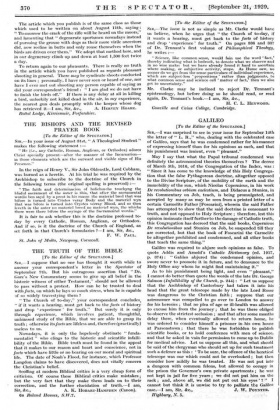[To- the Editor of the SPECTATOR.] SIR,—The issue is not-
as simple as Mr. Clarke would have us believe, when he urges that " the Church of to-day, if it wants a hearing, must get back to the facts of history
and drop ' experience ! for truth." On pages 336 and 887
of Dr. Tennant's first volume of Philosophical Theology, he writes :- " Science, like common sense, would fain use the word fact,' thereby indicating what is bedrock, to denote what we observe-and in no wise make: but we have already found it hard to ascertain where making, or subjective activity, stops. As Hume saw, no sooner do we get from the sense-particulars of individual experience, which are subject-less ` propositions ' rather than judgments, to what common sense and science call ' matter of fact,' then we also get to uncertainty."
Mr. Clarke may be inclined to reject Dr. Tennant's epistemology, but before doing so he should read, or read again, Dr. Tennant's book.—I am, Sir, &c.,
H. C. L. HEYWOOD.
Gonville and Caius College, Cambridge.












































 Previous page
Previous page